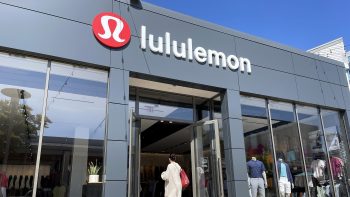
For businesses, dealing with counterfeit goods is a game of Whac-A-Mole
For businesses, dealing with counterfeit goods is a game of Whac-A-Mole

Deborah Holtschlag isn’t really a plant lady, but she is married to a plant man.
“He does not golf,” she said. “He gardens.”
That was a delight, until the dahlias took over their patio. So Holtschlag designed a solution: a planter that attaches to railing balusters with a tension clip. It makes the plants look kind of like they’re floating. And that’s the feature that made her company, Plant Traps, go viral.
But it didn’t take long for copycats to pop up all over the internet.
“I saw a knockoff using all of my language,” said Holtschlag. “[They] printed off all my directions in their box, used my trademark in their metadata.”
Counterfeit items are a problem for everything from small businesses like Holtschlag’s to Nike and Louis Vuitton. According to the United States Patent and Trademark Office, $2 trillion worth of counterfeit products are sold each year.
Marketplace reviewed photos of the listings that ripped off Holtschlag’s design. Some sellers went as far as stealing photos of her holding her planter full of red mums and just cropping out her head.
Seeing her hard work copied again and again sent Holtschlag into overdrive. She began filing reports with Amazon, Temu and eBay. This involved uploading her legal documents and screenshots of listings. Each complaint takes about 30 minutes.
“It became a full-time job, to be honest. At first, I was doing all the reporting myself, four hours a day,” she said.
Temu, eBay and Amazon — a Marketplace underwriter — sent statements saying counterfeit goods are prohibited on their platforms and that they have measures to both prevent the sale of these items and respond to complaints.
Holtschlag said retailers usually take action within a few days. But new listings kept popping up, so she hired lawyers. This April alone, they found more than 500 knockoffs selling for as little as 99 cents a planter. The real ones cost $19.99.
Hilton Hart, CEO of Edison IP Enforcement, an investigative firm that goes after counterfeiters, said e-commerce platforms — especially ones that feature third party sellers — have turned tackling fakes into a global game of Whac-A-Mole.
“Every country’s legal system is different. And you have to take individual actions in each of the different countries,” said Hart. “And so it just becomes a logistical nightmare.”
Hart said the majority of counterfeits come from China, where manufacturing is lightning fast and can be super secretive. He’s actually sent investigators there for cases that require serving paperwork in person.
“And the address said floor five, but there were only three floors in the building or the investigator would just show up to an empty field and there’s no office building in sight,” he said.
This shady business is tough for companies. But it’s also a problem for consumers. Anonymous sellers abroad might not have high quality standards. Some products can even be dangerous.
“And it’s sort of a game of roulette,” said Kari Kammel, who directs the Center for Anti-Counterfeiting and Product Protection at Michigan State University. “We’re talking potentially very high risk for injury, for, in some cases death, depending on what it is.”
Think: counterfeit vitamins or car seats. And Kammel said even seemingly innocent items, like clothing can contain ingredients like lead.
Recently proposed legislation would require companies to vet sellers before listing. In the meantime, it’s on consumers. Kammel encourages shoppers to buy directly from brands and reputable retailers. She’s well aware though, that people purposely scour the internet for fake Gucci belts and Apple headphone lookalikes. But Kammel said to think twice because they can have seedy connections.
“A lot of counterfeiting, not all, but a lot of it, is connected to organized crime. It’s connected to illicit drug networks. It might be going to support child labor,” she said. “Like, there’s a reason why this product is so cheap.”
Correction (June 26, 2024): A previous version of this story misstated the role of Edison IP Enforcement.
There’s a lot happening in the world. Through it all, Marketplace is here for you.
You rely on Marketplace to break down the world’s events and tell you how it affects you in a fact-based, approachable way. We rely on your financial support to keep making that possible.
Your donation today powers the independent journalism that you rely on. For just $5/month, you can help sustain Marketplace so we can keep reporting on the things that matter to you.

















